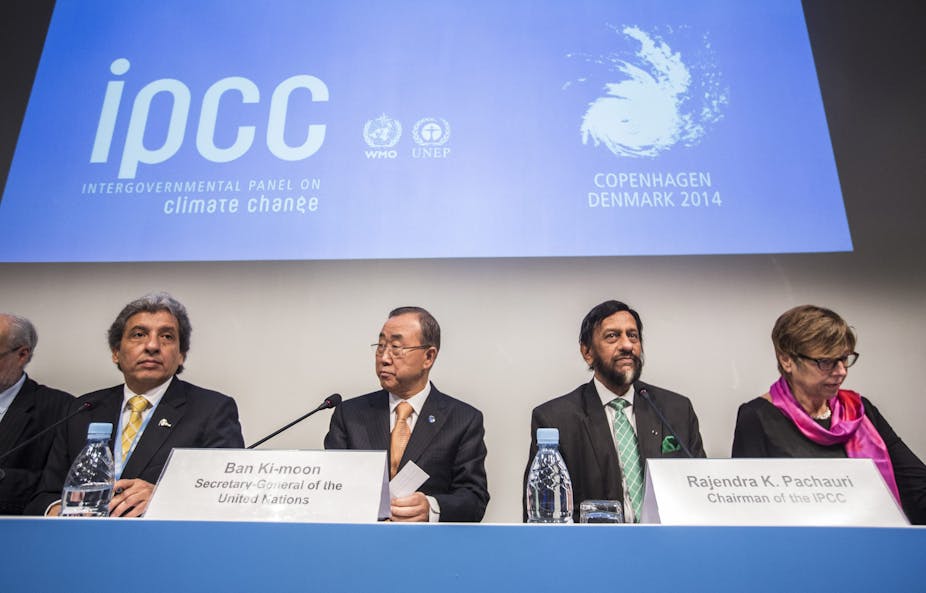The headline statements of the Intergovernmental Panel on Climate Change’s new Synthesis Report – unequivocal climate change, almost certainly driven largely by humans, and an urgent need to cut emissions – won’t come as any surprise to people who paid attention to the three larger reports the IPCC has released over the past 14 months.
But reading the full synthesis report, as opposed to the shorter Summary for Policymakers (SPM), shows that while the facts haven’t changed, the IPCC has subtly altered its approach to how it presents this information. Instead of dealing largely in forecasts and responses, as in previous syntheses, it now frames the climate problem squarely in terms of risk management.
Not everything of importance in the full synthesis report made it into the SPM. The language in the SPM is also weaker, particularly about the nature of irreversible risks and about threats to food security. The full report contains valuable pointers for managing climate risks and the benefits of acting, so should be preferred for decision-making purposes.
The report is also great for debunking some of the persistent myths about climate change, both scientific and economic. But, unfortunately given the urgent need for new economic policy to cut carbon, it’s stronger on the former than the latter.
Combating climate myths
The report is useful in addressing some of the misinformation flying around in political commentary and the popular press. These include the following:
Myth: climate action is a barrier to development, especially for the poor.
The report says:
Risks … are generally greater for disadvantaged people and communities in countries at all levels of development. Limiting the effects of climate change is necessary to achieve sustainable development and equity, including poverty eradication. Substantial emissions reductions over the next few decades can reduce climate risks in the 21st century and beyond, increase prospects for effective adaptation, reduce the costs and challenges of mitigation in the longer term, and contribute to climate-resilient pathways for sustainable development.
Myth: The planet hasn’t warmed since 1998.
The report says:
Ocean warming dominates the increase in energy stored in the climate system, accounting for more than 90% of the energy accumulated between 1971 and 2010 (high confidence), with only about 1% stored in the atmosphere. It is virtually certain that the upper ocean (0−700 m) warmed from 1971 to 2010. The globally averaged combined land and ocean surface temperature data as calculated by a linear trend, show a warming of 0.85C over the period 1880 to 2012. In addition to robust multi-decadal warming, the globally averaged surface temperature exhibits substantial decadal and interannual variability. As one example, the rate of warming over the past 15 years (1998–2012; 0.05C per decade), which begins with a strong El Niño, is smaller than the rate calculated since 1951 (1951–2012; 0.12C per decade).
Myth: Coal will be the fuel of the future.
The report says:
There are multiple mitigation pathways that are likely to limit warming to below 2C relative to pre-industrial levels. These pathways would require substantial emissions reductions over the next few decades and near zero emissions of CO2 and other long-lived greenhouse gases by the end of the century.“
The case for action
The one major omission from this report (which, to be fair, is also poorly represented in the research literature) is how the economic case for taking action can be better addressed.
The report contains an incomplete and flawed cost-benefit structure. Cost-benefit analysis is the standard method for assessing whether a policy is merited. It is used for short-term decision making but is totally unsuited to decisions over century-long time scales.
The lack of clear cost-benefit outcomes in this and previous reports has been used as a deny-and-delay tactic for the past two decades. This argument is nothing more than a red herring, and it’s getting very smelly.
The report pretty much admits the shortcomings of cost-benefit analysis, in the following two sentences:
Methods of valuation from economic, social and ethical analysis are available to assist decision making. But they cannot identify a single best balance between mitigation, adaptation and residual climate impacts.
Yet the report is perfectly clear on the physical risks to global-scale systems and the potential for total disruption of regional, national and international economies. It states:
Without additional mitigation efforts beyond those in place today, and even with adaptation, warming by the end of the 21st century will lead to high to very high risk of severe, widespread, and irreversible impacts globally.
and:
Climate change exacerbates other threats to social and natural systems, placing additional burdens particularly on the poor.
There is no existing economic model that can assess the full costs of either of these outcomes adequately. When costing mitigation to keep likely warming below 2C, the report suggests an annual reduction of consumption growth by 0.04-0.14% over the century. This is against a backdrop of consumption growth of between 1.6% and 3% per year.
It’s ridiculous to suggest that severe, widespread, and irreversible climate impacts would cost us less than this. Much more likely is that these growth rates of 1.6% to 3%, if they were achievable and sustainable at all, would be severely disrupted by a changing climate.
The report could certainly afford to address this point more forcefully. It says:
Effective decision making to limit climate change and its effects can be informed by a wide range of analytical approaches for evaluating expected risks and benefits, recognizing the importance of governance, ethical dimensions, equity, value judgments, economic assessments and diverse perceptions and responses to risk and uncertainty.
But acting on climate is ultimately an ethical, not an economic, consideration. Insufficient policy action is a declaration of self-interest, condemning our children, grandchildren and the planetary system that supports them, to a dystopian future. That’s what the report should say.

